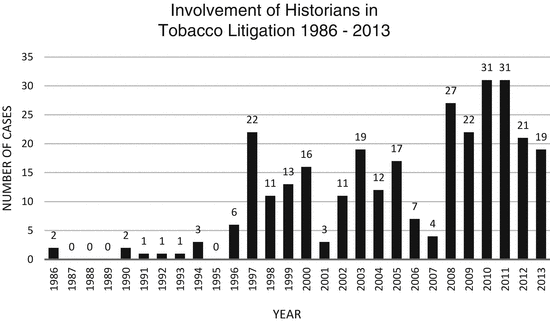Final Conclusion on the Involvement of Historians in Tobacco Litigation

(1)
FWO Fellow at Ghent University, Ghent, Belgium
Abstract
This chapter gives a final conclusion on the role historians have played in tobacco litigation based on qualitative and quantitative inquiries the book has presented in previous chapters. Although experts for the defence are not following professional historical ethics, experts for the plaintiff are showing that litigation-driven history can produce solid historical research.
Never doubt that a small group of thoughtful, committed citizens can change the world. Indeed, it is the only thing that ever has.
Margaret Mead
In an article from 2004, Proctor listed 29 historians who had witnessed for the tobacco industry.1 Two years later Proctor and Kyriakoudes compiled a list of 36 historians who were working for tobacco companies as expert witnesses.2 By 2008, that number had risen to 40.3 In his book from 2012, Proctor listed 48 historians who had testified for the defence.4 I have made a list with 50 experts based on my quantitative research of the involvement of historians in tobacco litigation.5 I have left out three names from Proctor’s list, because in one case I did not consider the person to be a historian, and in the two other instances I did not find any trial records to prove their involvement. While on the other hand, I have added five historians in addition to Proctor’s list; on the one hand, the historians who have testified for the plaintiffs, Brandt, Díaz-Hernández, Kyriakoudes, and Proctor, and on the other, I have added one historian to the list of the defendants’ witnesses.
Furthermore, the number of cases in which historians were involved is higher in the list which I have compiled than compared to previous lists. Especially in recent years, with the Engle Progeny cases well underway, historians are testifying at a higher rate than ever before.6 Between 1986 and 2014, 50 historians were active in 314 cases.7 I found that the phenomenon of repeat players is also taking shape with historians as expert witnesses.8 Of the 50 historians involved, 22 have served in only one or two cases, while 17 other experts have engaged in ten or more cases respectively. Historians like Proctor (93 cases), Kyriakoudes (66 cases), Michael Schaller (36 cases), Joan Hoff (31 cases), Robert Norrell (28 cases), Randy Roberts (25 cases), James Kirby Martin (23 cases), Terry Parssinen (22 cases), Elizabeth Cobbs Hoffman (21 cases), William Stueck (20 cases), Lacy Ford (19 cases), Michael Parrish (17 cases), Peter English (15 cases), and Kenneth Ludmerer (15 cases) have all become experts at expert witnessing.9 The high number of cases attended by Proctor and Kyriakoudes is obvious, as they are the only historians willing to continue to testify against the tobacco companies in court, despite the harassing campaign that has been conducted by the tobacco industry against both historians.10 The number of experts working for the defence is probably much higher. Table 17.1 presents the number of cases historians participated in on a yearly basis.
Table 17.1
Involvement of historians in tobacco litigation from 1986 to 2013
 |
As this chart demonstrates, there are two clear spikes of increased involvement. The first started around 1997–1998 when historians were recruited in the state attorney general trials by legal firms working for the tobacco industry. A second spike began in 2008, and continues to this day, when the Supreme Court of Florida ruled that plaintiffs had to sue as individuals, not as members of a class. This resulted in more than 8,000 individual cases. Up until now, sixteen different historians – fourteen for the defence and two for the plaintiff – have been active as expert witnesses in Engle Progeny cases.11
Of those who testified for the defence, only two historians, John Burnham, and Jon Harkness have published something on the history of smoking albeit not extensive nor on the core issues treated in court. Harkness wrote one article on public health on smoking during the Eisenhower and Kennedy administrations.12 In other words, 4 % of the historians testifying for the tobacco industry have published on tobacco before their testimony, or afterwards. Another disturbing figure, which I have discussed in the previous chapter, is the limited number of historians offering information on their involvement in tobacco litigation on their website or in academic debate. It is in the spirit of and with the conviction that there is a need for more transparency that I have put my overview of these 50 expert witnesses online, free to visit for anyone interested.13